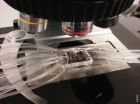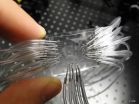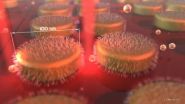(Press-News.org) Today, the majority of cancers are detected on the macroscopic level, when the tumor is already composed of millions of cancer cells and the disease is starting to advance into a more mature phase. But what if we could diagnose cancer before it took hold- while it was still only affecting a few localized cells? It would be like putting a fire out while it was still just a few sparks versus after having already caught on and spread to many areas of the house.
An international team of researchers, led by ICFO- Institute of Photonic Sciences in Castelldefels, announce the successful development of a "lab-on-a-chip" platform capable of detecting protein cancer markers in the blood using the very latest advances in plasmonics, nano-fabrication, microfluids and surface chemistry. The device is able to detect very low concentrations of protein cancer markers in blood, enabling diagnoses of the disease in its earliest stages. The detection of cancer in its very early stages is seen as key to the successful diagnosis and treatment of this disease.
This cancer-tracking nano-device shows great promise as a tool for future cancer treatments, not only because of its reliability, sensitivity and potential low cost, but also because of its easy carry-on portable properties, which is foreseen to facilitate effective diagnosis and suitable treatment procedures in remote places with difficult access to hospitals or medical clinics.
HOW DOES IT WORK: Although very compact (only a few square centimeters), the lab-on-a-chip hosts various sensing sites distributed across a network of fluidic micro-channels that enables it to conduct multiple analyses. Gold nano-particles lie on the surface of the chip and are chemically programed with an antibody receptor in such a way that they are capable of specifically attracting the protein markers circulating in blood. When a drop of blood is injected into the chip, it circulates through the micro-channels and if cancer markers are present in the blood, they will stick to the nano-particles located on the micro-channels as they pass by, setting off changes in what is known as the "plasmonic resonance". The device monitors these changes, the magnitude of which are directly related to the concentration/number of markers in the patient blood thus providing a direct assessment of the risk for the patient to develop a cancer.
ICREA Professor at ICFO Romain Quidant, coordinator of the project comments, "the most fascinating finding is that we are capable of detecting extremely low concentrations of this protein in a matter of minutes, making this device an ultra-high sensitivity, state-of-the-art, powerful instrument that will benefit early detection and treatment monitoring of cancer". In 2009, Prof. Quidant's research group at ICFO, in collaboration with several groups of oncologists, joined the worldwide effort devoted to the ultra-sensitive detection of protein markers located on the surface of cancer cells and in peripheral blood, which had been determined to be a clear indicator of the development of cancer. In 2010, they successfully obtained funding for the project called SPEDOC (Surface Plasmon Early Detection of Circulating Heat Shock Proteins and Tumor Cells) under the 7th Framework Program (FP7) of the European Commission. The effort was also boosted by generous philanthropic support from Cellex Foundation Barcelona. Today's announcement is an important outcome of this project.
INFORMATION:
About this study
This work has been supported by Cellex Foundation Barcelona and by the SPEDOC project, funded by the Seventh Framework Program (FP7) of the European Commission.
Reference: Srdjan S Acimovic , Maria Alejandra Ortega , Vanesa Sanz , Johann Berthelot , Jose Luis Garcia-Cordero , Jan Renger , Sebastian J. Maerkl , Mark Patrick Kreuzer , and Romain Quidant, LSPR Chip for Parallel, Rapid and Sensitive Detection of Cancer Markers in Serum, Nano Letters, DOI: 10.1021/nl500574n
About ICFO
ICFO-The Institute of Photonic Sciences was created in 2002 by the government of Catalonia and the Technical University of Catalonia as a center of research excellence devoted to the science and technologies of light with a triple mission: to conduct frontier research, train the next generation of scientists, and provide knowledge and technology transfer. Today, it is one of the top research centres worldwide in its category as measured by the Mapping Scientific Excellence ranking.
Research at ICFO targets the forefront of science and technology based on light with programs directed at applications in Health, Renewable Energies, Information Technologies, Security and Industrial processes, among others. The institute hosts 300 professionals based in a dedicated building situated in the Mediterranean Technology Park in the metropolitan area of Barcelona.
Researchers at ICFO publish in the most prestigious journals and collaborate with a wide range of companies around the world. The institute runs a vigorous technology transfer program in which more than 30 national and international industries participate. It has also created 5 spin-off companies to date. The institute is generously supported by Cellex Foundation Barcelona, which supports several frontier research projects and programs focused on young talented researchers.
Links:
Link to the Paper: http://pubs.acs.org/doi/abs/10.1021/nl500574n
Link to the research group led by Prof. Romain Quidant:
http://www.icfo.eu/research/group_details.php?id=27
Videos:
SPEDOC Lab-on-a-chip video:
https://www.youtube.com/watch?v=5GFoH5cwFGQ&list=PLLnA8B3ZULyEcewIzP3DG6CawEiUYaH7h&index=7
Video about the research carried out by the group led by Romain Quidant:
https://www.youtube.com/watch?v=5WtsJpRI9w0&index=2&list=PLLnA8B3ZULyFcfAwUUYL3JAkeny6KpY5L
One small chip -- one giant leap forward for early cancer detection
An ultra-sensitive nano-chip capable of detecting cancer at early stages
2014-05-19
ELSE PRESS RELEASES FROM THIS DATE:
Study finds limited benefit for vitamin D in asthma treatment
2014-05-19
Adding vitamin D to asthma treatment to improve breathing only appears to benefit patients who achieve sufficient levels of the supplement in the blood. Overall, the ability to control asthma did not differ between a study group that received vitamin D supplements and a group that received placebo, according to new research at Washington University School of Medicine in St. Louis.
"Previous studies suggested that if you have asthma and low levels of vitamin D in the blood, you have worse lung function, more asthma attacks and more emergency room visits than asthma patients ...
Illuminating neuron activity in 3-D
2014-05-18
Researchers at MIT and the University of Vienna have created an imaging system that reveals neural activity throughout the brains of living animals. This technique, the first that can generate 3-D movies of entire brains at the millisecond timescale, could help scientists discover how neuronal networks process sensory information and generate behavior.
The team used the new system to simultaneously image the activity of every neuron in the worm Caenorhabditis elegans, as well as the entire brain of a zebrafish larva, offering a more complete picture of nervous system ...
Team validates potentially powerful new way to treat HER2-positive breast cancer
2014-05-18
Cold Spring Harbor, NY -- Scientists at Cold Spring Harbor Laboratory (CSHL) today report a discovery that they hope will lead to the development of a powerful new way of treating an aggressive form of breast cancer.
The breast cancer subtype in question is commonly called "HER2-positive"; it's a subset of the disease affecting about one patient in four, in which tumor cells overexpress a signaling protein called HER2. The blockbuster drug Herceptin is a treatment of choice for many women with HER2-positive breast cancer, but in most cases, resistance to the treatment ...
COPD patients at significantly higher risk of heart failure
2014-05-18
ATS 2014, SAN DIEGO ─ As if increased risks of high blood pressure, respiratory infections, lung cancer and even depression weren't enough, researchers say patients with chronic obstructive pulmonary disease (COPD) have another complication to worry about: heart failure. That's according to a new study from the Morehouse School of Medicine in Atlanta, which found the prevalence of heart failure is significantly higher in patients with COPD compared to the rest of the study population. They also found that the risk was especially high among African-American patients ...
Patients with low pulmonary vascular resistance may benefit from complex procedure for PH
2014-05-18
ATS 2014, SAN DIEGO ─ Patients with chronic pulmonary thromboembolic disease may benefit from pulmonary thromboendarterectomy (PTE), even if the patients don't have severe pulmonary hypertension, according to University of California, San Diego, researchers.
The study was presented at the 2014 American Thoracic Society International Conference.
UCSD pioneered PTE in the 1970s for patients who suffered from chronic thromboembolic pulmonary hypertension (CTEPH). During PTE, surgeons put a patient on a heart-lung machine, cool the body to reduce its need for oxygen ...
Urine test could help clinicians spot blood clots in at-risk patients
2014-05-18
ATS 2014, SAN DIEGO ─ A new study by researchers from California and Canada indicates a simple urine test can indicate the presence of venous thromboembolism, a blood clot that has broken free from its point of origin and which travels through the bloodstream, eventually lodging in a vein. The test evaluates the levels of fibrinopeptide B (FPB), a small peptide that's released when a thrombosis forms and which is removed from the body through urine.
The results of the study will be presented at the American Thoracic Society's 2014 International Conference here.
Study ...
Sleep apnea is common after acute respiratory failure
2014-05-18
ATS 2014, SAN DIEGO ─ Clinically important sleep apnea is common among survivors of acute respiratory failure, according to a new study presented at the 2014 American Thoracic Society International Conference.
"Insomnia is a frequent complaint among survivors of critical illness," said Dr. Elizabeth Parsons, MD, MSc, of the Division of Pulmonary & Critical Care Medicine at the University of Washington in Seattle. "We examined a small cohort of survivors of acute respiratory failure to understand modifiable contributors to insomnia, including sleep apnea."
The ...
Bacteria in mouth may diagnose pancreatic cancer
2014-05-18
Patients with pancreatic cancer have a different and distinct profile of specific bacteria in their saliva compared to healthy controls and even patients with other cancers or pancreatic diseases, according to research presented today at the annual meeting of the American Society for Microbiology. These findings could form the basis for a test to diagnose the disease in its early stages.
"Our studies suggest that ratios of particular types of bacteria found in saliva may be indicative of pancreatic cancer," says Pedro Torres of San Diego State University who presented ...
Temple-led study finds no benefit in taking statin drugs for COPD exacerbation prevention
2014-05-18
(Philadelphia, PA) – A statin drug commonly used to lower cholesterol is not effective in reducing the number and severity of flare ups from chronic obstructive pulmonary disease (COPD), according to the results of a large multicenter clinical trial designed and directed by Gerard J. Criner, MD, Director of Pulmonary and Critical Care Medicine at Temple University Hospital in Philadelphia, PA.
Dr. Criner, who served as the study's Principal Investigator, will report the results on May 18 at the American Thoracic Society's annual international scientific meeting in San ...
QVAR® real-world study to be presented at annual ATS International Conference
2014-05-18
Jerusalem, May 18, 2014 – Teva Pharmaceutical Industries Ltd., (NYSE: TEVA) today announced that results from a real-life, retrospective, observational study of QVAR® will be presented at the American Thoracic Society (ATS) 2014 International Conference in San Diego on May 18, 2014. QVAR® is an inhaled corticosteroid (ICS) indicated in the maintenance treatment of asthma as a prophylactic therapy in patients 5 years of age and older.
Data to be presented at the meeting evaluated the benefit of treating asthma with small particle treatments, like QVAR®, in comparison ...
LAST 30 PRESS RELEASES:
Cancer and inflammation: immunologic interplay, translational advances, and clinical strategies
Bioactive polyphenolic compounds and in vitro anti-degenerative property-based pharmacological propensities of some promising germplasms of Amaranthus hypochondriacus L.
AI-powered companionship: PolyU interfaculty scholar harnesses music and empathetic speech in robots to combat loneliness
Antarctica sits above Earth’s strongest “gravity hole.” Now we know how it got that way
Haircare products made with botanicals protects strands, adds shine
Enhanced pulmonary nodule detection and classification using artificial intelligence on LIDC-IDRI data
Using NBA, study finds that pay differences among top performers can erode cooperation
Korea University, Stanford University, and IESGA launch Water Sustainability Index to combat ESG greenwashing
Molecular glue discovery: large scale instead of lucky strike
Insulin resistance predictor highlights cancer connection
Explaining next-generation solar cells
Slippery ions create a smoother path to blue energy
Magnetic resonance imaging opens the door to better treatments for underdiagnosed atypical Parkinsonisms
National poll finds gaps in community preparedness for teen cardiac emergencies
One strategy to block both drug-resistant bacteria and influenza: new broad-spectrum infection prevention approach validated
Survey: 3 in 4 skip physical therapy homework, stunting progress
College students who spend hours on social media are more likely to be lonely – national US study
Evidence behind intermittent fasting for weight loss fails to match hype
How AI tools like DeepSeek are transforming emotional and mental health care of Chinese youth
Study finds link between sugary drinks and anxiety in young people
Scientists show how to predict world’s deadly scorpion hotspots
ASU researchers to lead AAAS panel on water insecurity in the United States
ASU professor Anne Stone to present at AAAS Conference in Phoenix on ancient origins of modern disease
Proposals for exploring viruses and skin as the next experimental quantum frontiers share US$30,000 science award
ASU researchers showcase scalable tech solutions for older adults living alone with cognitive decline at AAAS 2026
Scientists identify smooth regional trends in fruit fly survival strategies
Antipathy toward snakes? Your parents likely talked you into that at an early age
Sylvester Cancer Tip Sheet for Feb. 2026
Online exposure to medical misinformation concentrated among older adults
Telehealth improves access to genetic services for adult survivors of childhood cancers
[Press-News.org] One small chip -- one giant leap forward for early cancer detectionAn ultra-sensitive nano-chip capable of detecting cancer at early stages



